It is difficult to manage a mobile app development project without proper strategies. Agile and Scrum project management are just two of the best methodologies for managing your projects. Agile project management is about the iterative delivery of software product development, which makes it more flexible to respond faster to any changes. Although Scrum is an Agile methodology. Generally, it is even more precise-defining particular work cycles called sprints that produce features at the end of each cycle. Some of the other strategies incorporate a no-code development platform for faster results, flawless quality, and on-point project management software to efficiently track sprint backlogs. After launching, quickly manage bugs regularly using an organized method.
Understanding the importance of project management in mobile app development
To ensure a successful mobile app project, having a proper management strategy is essential. Furthermore, fostering a strong client-agency relationship can greatly contribute to the overall success of the project. This relationship allows for clear communication, efficient decision-making, and ultimately, better project outcomes.
Project management is a key to organizing and controlling processes in mobile app development. This determines the success of software product development. This utilizes various project management methodologies including agile project management, scrum project management, and similarly other methods like waterfall and kanban.

Each of these methodologies offers unique and irreplaceable advantages in project life cycle management, stakeholder collaboration, sprint backlog creation and even managing bugs post-launch. All of these contribute significantly to product quality and also the efficiency of the whole working process around it.
The role of project management in app development
Project management is vital in app development, especially in two types of app development; mobile app development and software product development. It also encompasses the application of the proper project management methodologies such as Agile, Scrum, Waterfall, and Kanban. These methodologies cover project life cycle steps, and they are scheduling, collaboration with stakeholder interaction, managing sprint backlogs, tracking issues, and bug tracking post-launch. The introduction of a no-code development plan has seen project management go a step further to watch over the use of such platforms to speed up development.
Benefits of effective project management
For mobile app and software product development, effective project management guarantees easy implementation of agile, scrum, waterfall, and Kanban methodologies. Moreover, it enhances your project life-cycle, promoting proper management of post-launch bugs, sprint backlogs, and stakeholder collaboration.
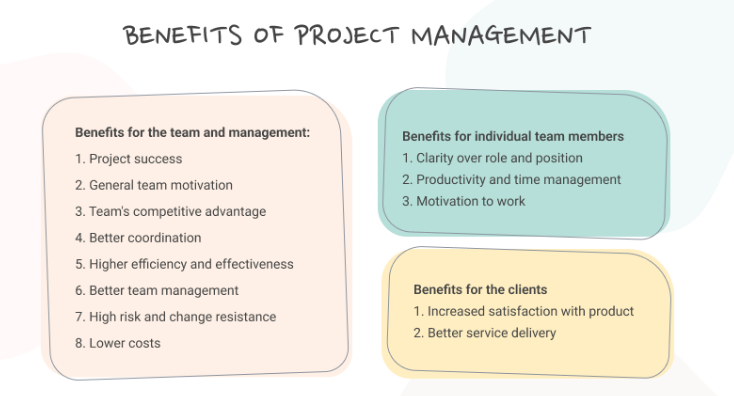
The project management software offers excellent teamwork. On the other hand, extreme programming and no-code development platforms hasten the entire process. Project management benefits include:
- Efficient resource utilization and risk management.
- Better stakeholder collaboration and communication.
- Improved project success rate.
Manage your mobile App development with a project management tool
In order to streamline the workflow and enhance the team's efficiency in a mobile app project management, a clear agency positioning is essential. It helps in aligning the goals and efforts, thereby enabling the team to deliver the project on time and within the budget. Furthermore, it facilitates smooth communication and fosters collaboration among the team members.
Mobile app project management incorporates various workflows, including branding, design and development. While managing these tasks, it's also crucial to have a robust approach towards agency account management, as it can influence the overall project outcomes. With a balanced approach, it can ensure streamlined project delivery and client satisfaction.
Moreover, while managing your mobile app project, leveraging certain tools can boost efficiency and output drastically. One such tool that you can utilize in your project workflow is the stellar client management app discussed in a previous article. This service can revolutionize the way your team interacts with clients, making project management a breeze.
When managing a mobile app project, one crucial aspect to consider is effective time management. An invaluable tool for this job is digital agency time tracking software, which allows smooth tracking and organization of tasks for maximum efficacy. This not only ensures the project stays on track, but also allows for streamlined workforce management.
As part of effective project management for mobile apps, it's crucial to monitor and analyze the usage of resources. With a reliable utilization report, project leaders can make robust, data-driven decisions for their mobile app projects. Such reports provide an insight into aspects like efficiency, productivity, and potential areas for improvement.
Developing your mobile app without any chaos! Project management tools are like magic for that. They keep everything organized in one place, so tasks, deadlines, and your team are all on the same page.
Imagine being able to chat with your designer right inside the app, or having things automatically move to the next step when finished. That's the magic of Bonsai's communication and workflow features. It doesn't matter if you're a tiny startup or a giant company, Bonsai can help your team work together better and get that app out the door faster and stronger.
Here is a guide on how to seamlessly create, organize, and track your tasks:
1. Create a new task in Bonsai
Creating a new task in Bonsai for your mobile app project is a simple process that helps maintain organization and progress. Bonsai's user-friendly interface enables you to assign tasks, establish deadlines, and monitor progress, guaranteeing efficient management of every aspect of your mobile app development.
Here are the steps for creating tasks with Bonsai for app project development:
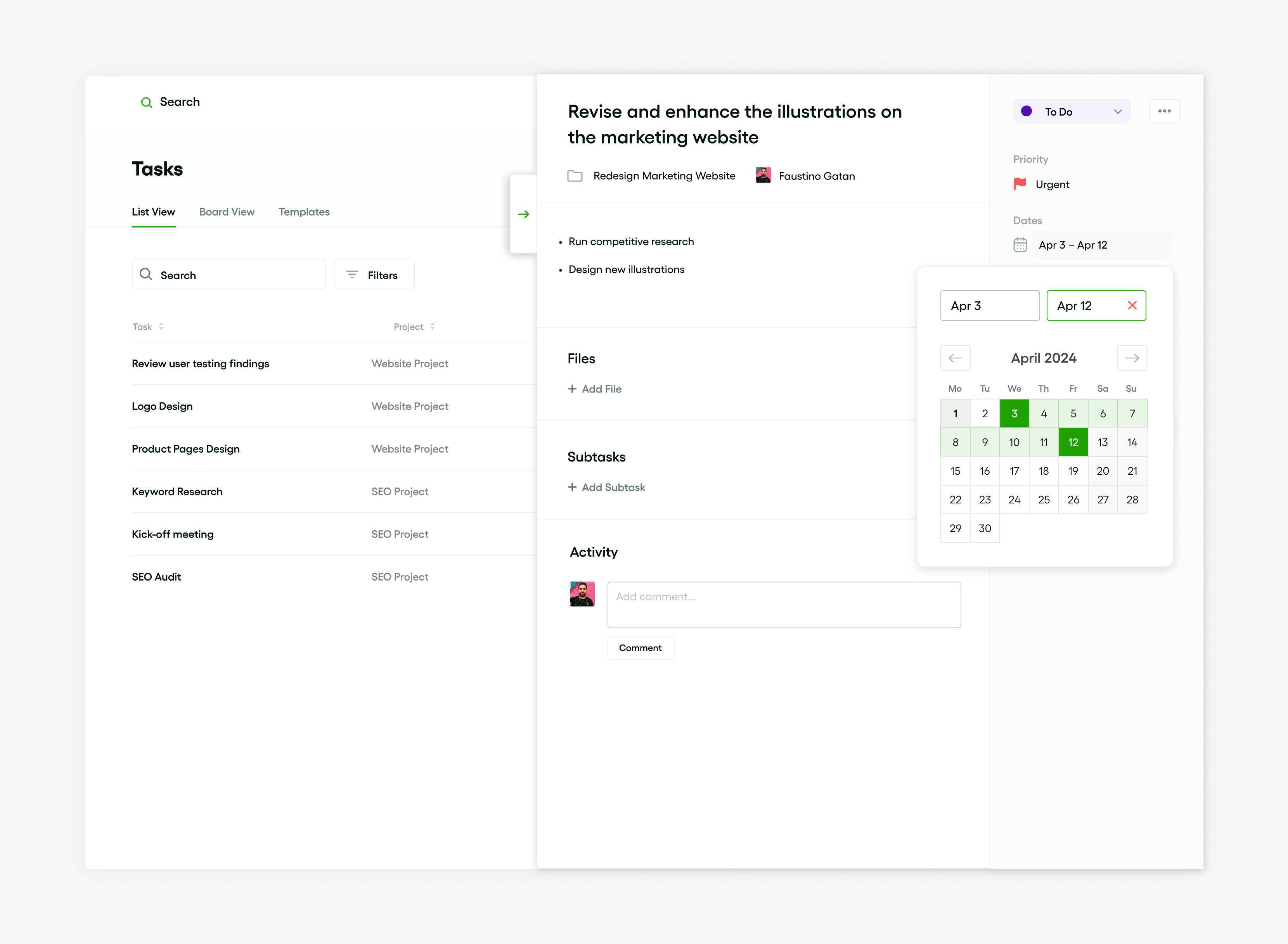
Here are the steps for creating tasks with Bonsai for app project development:
- Log into your Bonsai account and go to the Tasks page.
- Click "New Task" and input task details.
- Assign the task to a project and team member.
- Enter task name, description, and relevant info.
- Set start and due dates.
- Add subtasks if needed.
- Attach relevant files.
- Prioritize the task.
- Add custom tags.
- Set dependencies if applicable.
- Schedule recurring tasks if necessary.
- Track task status.
2. Organizing your tasks
No more sticky notes all over the wall! Bonsai makes organizing your mobile app development tasks a total breeze. It's super easy to use, like dragging and dropping building blocks. You can create tasks, assign them to your team, and see exactly how everything's moving along.
Plus, Bonsai helps you prioritize what's most important and keeps everyone on the same page with deadlines and live updates. Project management? More like stress-free management!
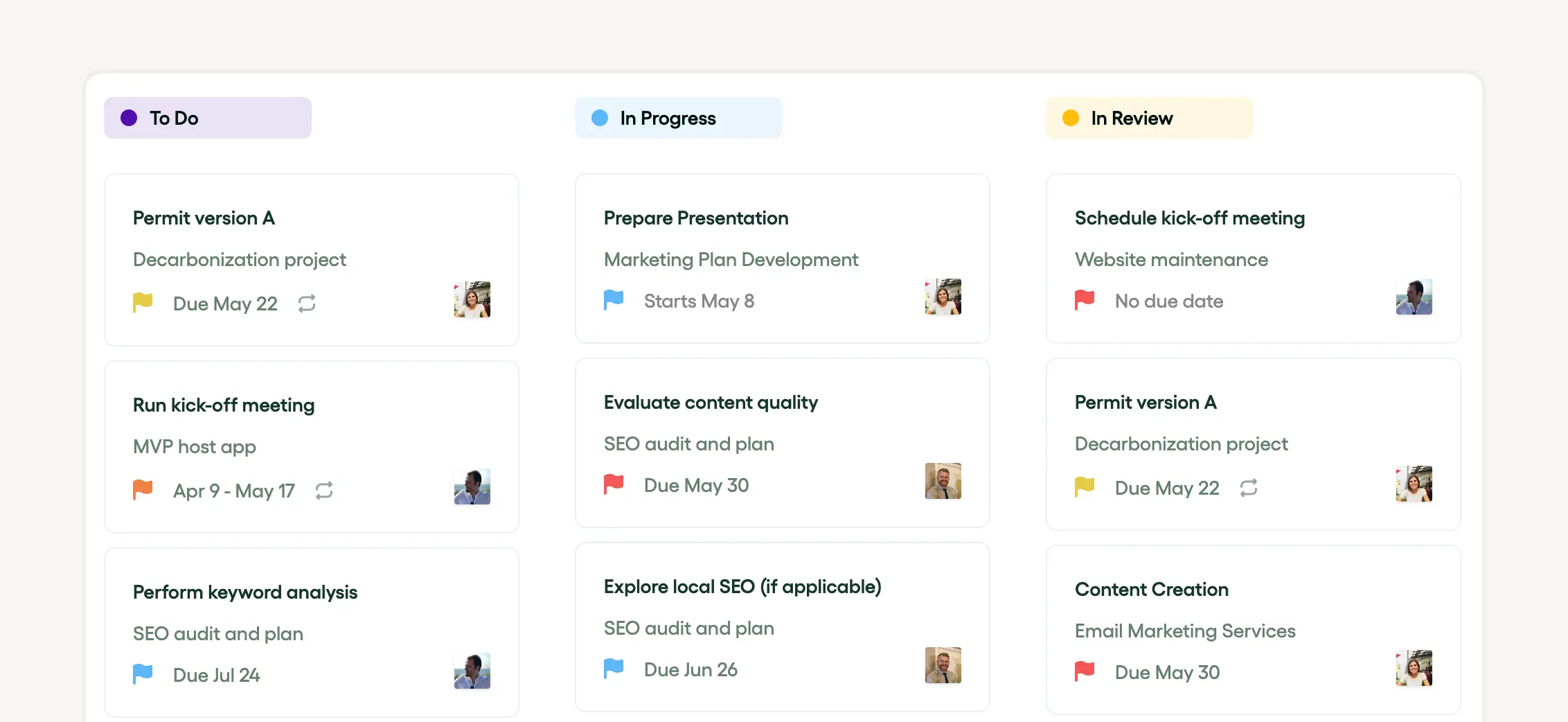
3. Track the status of your task
Bonsai's time tracking feature lets you monitor how long each task takes. You can start a timer from the task list, making it easy to log hours as you work. This is great for accurate client billing and budget management.
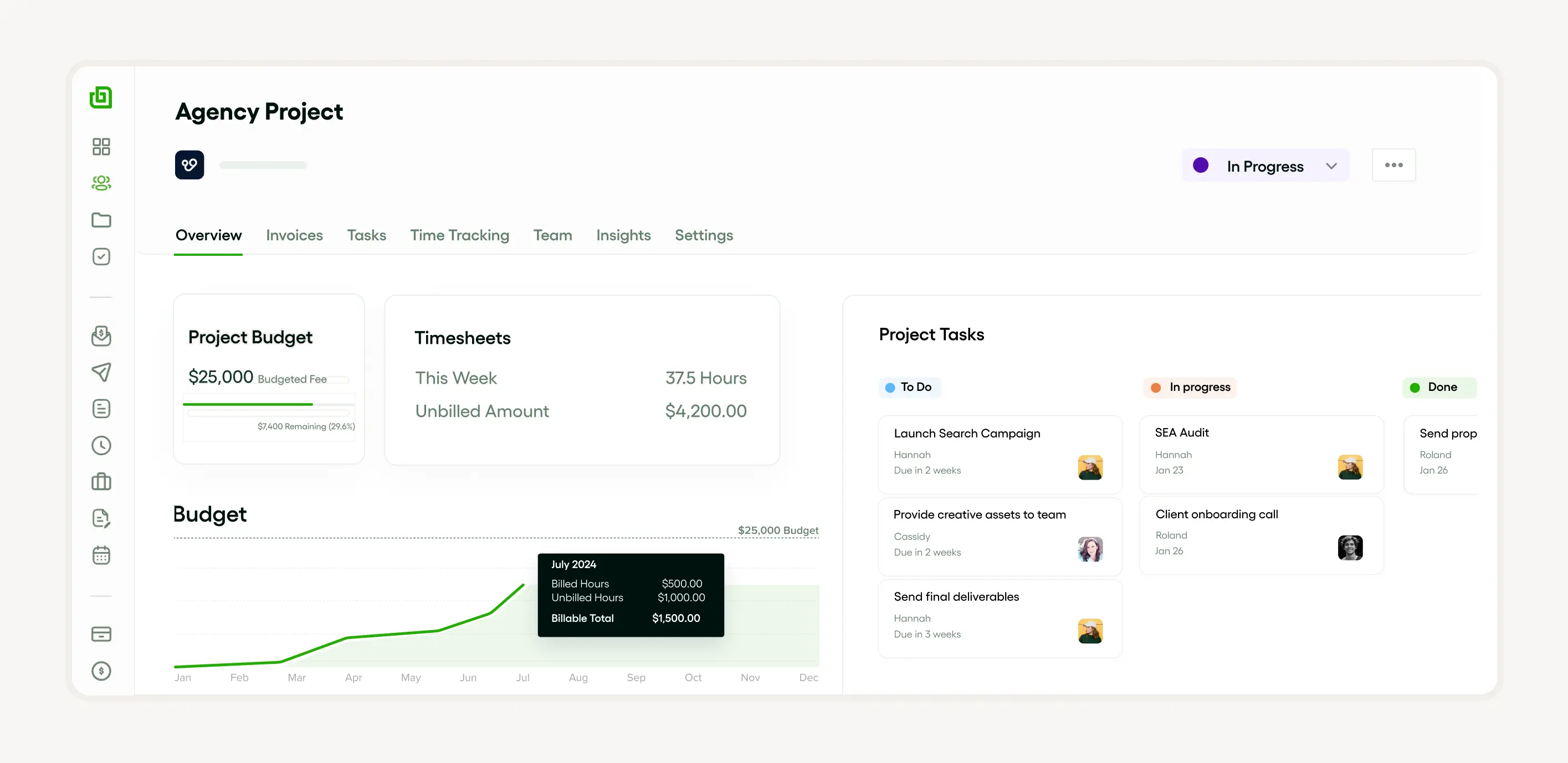
You can also set time estimates for tasks. Estimating task duration helps you plan your project timeline and allocate resources effectively. Comparing actual time spent with estimates helps you identify areas for improvement and optimize your workflow.
Key elements of mobile app project management
Good mobile app development combines the best of software product development, aspects like project management methodologies and stakeholder engagement. One of the most important things in a project life cycle is to choose the right methodology, agile project management such as scrum, kanban or waterfall. Additional aspects involve sprint backlog management, principles of extreme programming, and bug workflows post-launch. Additionally, utilizing a no-code development platform and feature-rich project management software could further advance the process flow and improve the product outcome.
Defining the scope and objectives
The main goal of this project is to define and apply numerous approaches to efficient mobile application project management. This will be a software product development project where stakeholders will be engaged during the various phases of the project development process. Agile project management will also emerge as a key area of emphasis.
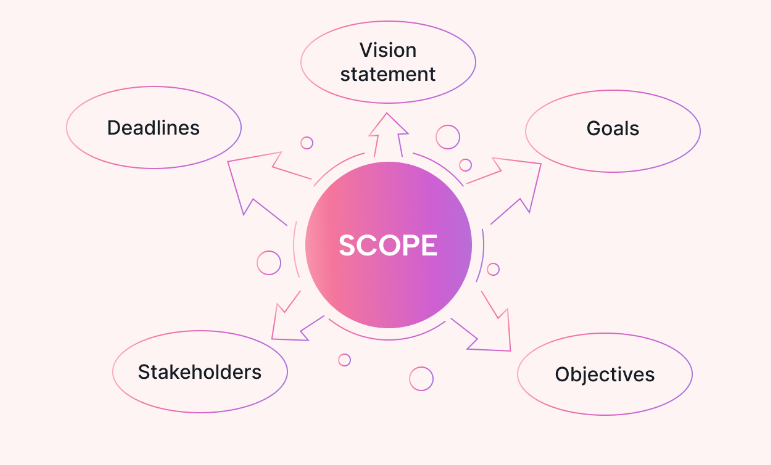
Aspects such as Scrum, Kanban, management of Sprint backlogs, and extreme programming will fall under this category. Also, the project will address how to manage bugs after releasing the site and make it convenient for users. A no-code development platform and effective management of the project, as well as stakeholder collaboration, will be an essential factor to address.
Planning and scheduling
In the sphere of software product development, one of the most important components of an effective process is proper planning and scheduling. They can be offered through different methods like Scrum project management and Waterfall project management among others. Scrum is an approach in the Agile project management family that focuses on incrementation, stakeholder involvement, and the control of a sprint backlog. On the other hand, Waterfall is a sequential approach to project management most suitable for situations when requirements are clear and unlikely to evolve. Some helpful concepts include project management to track bugs during and after deployment and no-code application development to accelerate mobile applications. Selecting an approach depends on the project’s life cycle and business requirements.
Resource allocation
Project management is an important component of software product development. Especially when it comes to task-based assignments on employee capabilities. It comprises methods such as scrum project management and waterfall project management. These strategies frequently relate to handling the sprint backlog, communicating with stakeholders, and controlling bugs after the application release. Budgeting resources is always important and specifically so when working on mobile app development projects.
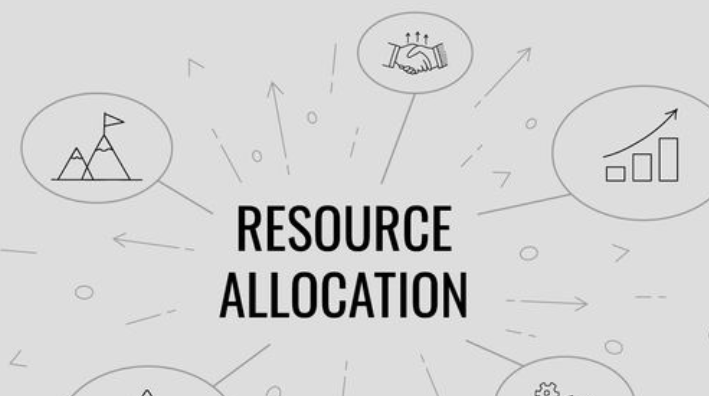
A few examples of proper tools are no-code development platforms and project management tools. Appropriate Project Management frameworks if they are applied systematically, resulting in the successful completion of projects. Obviously, this is a component of Resource Management. Software development can be an example of methods like extreme programming.
Risk management
There are several approaches you can use when it comes to risk management for software product development. Some of the common systems include Agile project management, Scrum project management and waterfall project management. Both project management methodologies are focused on different tasks: stake and claims, sprints, backlogs, and bugs after delivery. Thus, the proper evaluation of the project management software is crucial for addressing the issues of risk management.

It may involve a no-code application development environment for mobile applications that can help reduce the dangers associated with the project’s life cycle. This could possibly reduce the time required for the project. These strategies help to fortify the ground to address any other issues that may arise in a project. Hence, ensuring successful implementation of projects and the quality of the product that is offered to the market.
Choosing the right project management methodology
Choosing the right project management methods is important as this influences the chances of successfully completing mobile application development and software product development. The decision depends on the nature of the project and its phases. This also depends on the extent of cooperation with other project participants or any other conditions affecting the project. Examples include:
- Agile methodology
- Scrum methodology
- Waterfall methodology
Agile project management approach that emphasizes consistent progress and adaptability. Plus, Scrum management, which involves timely iterations referred to as Sprints. Alongside this, Waterfall is a more conventional approach, particularly for projects having predetermined specifications. The software also proves useful for managing these methodologies, controlling sprint backlogs, and dealing with post-launch bugs.
Waterfall methodology
Waterfall methodology is a linear method of project management. This is frequently utilized in software product development and mobile application development. It is characterized by a linear project life cycle and where the progress is viewed as a sequential process – more of a waterfall approach. Such an approach is inapplicable to the iterative nature of agile project management and scrum project management. There is a notable focus on documentation and preparatory work, which sometimes leads to increased engagement with stakeholders.
Agile methodology
Agile Methodology is one of the most used project management frameworks, mainly in mobile applications and software product development. It involves incremental improvement through project life cycles and focuses on the integration of stakeholders, which makes it a more effective product. Some of the prospective project management approaches consist of scrum project management, sprint backlog, and kanban project management. It also adopts techniques from extreme programming as well as customizes tools for the management of bugs after the release of the product. In contrast to waterfall project management which does not allow changes during the development process, Agile is perfect for choosing companies that use a no-code development platform.
Scrum methodology
Scrum is a part of the agile project management approach that is particularly employed in software product development including that of mobile applications. It is a cyclical approach to managing projects, which enables project managers and other stakeholders to be responsive and adaptive. It includes short cycles of work, known as ‘sprints’, with sprint reviews and backlog, making the project more flexible to change. In scrum project management, there is a planning sprint and every sprint is followed by a review and a sprint retrospective. Controversies like dealing with bugs after release are resolved early. With the aid of project management software, it enhances efficiency in the project life cycle according to this methodology.
Top project management tools for mobile app development
In the case of mobile app development, proper management of a project is crucial to have a flow through the project life cycle. Programs such as Trello, Basecamp, and Jira continue to be used due to their dashboards with features ranging from Agile, Scrum, and Kanban project management. They help in handling stakeholders, the backlog for sprints, and bug tracking after the release. In software product development, no-code development platforms are transforming app creation, enhancing the value of project management.
Overview of Jira
Jira is an effective tool for project management created by Atlassian. It supports agile project management, scrum project management, and kanban project management approaches among others. It is widely employed in mobile application development, software product development and no-code development platform. For project life cycles, Jira provides tools to structure tasks, monitor the progress, and coordinate interactions with stakeholders.
Benefits of Trello
Trello is a robust project management tool that supports other project management frameworks including Scrum and the Kanban method. It is particularly helpful for tracking and overseeing all aspects of creating and maintaining a mobile application or a software product. Using Trello, one can manage sprint backlogs and foster stakeholder engagements. Trello is of great value to project managers as it provides them with an effective way of monitoring the whole project flow, making productivity and success rates higher.
Using Asana for app development
Asana - as we know, it is a project management tool that makes the mobile app development process smoother. The software is designed for agile project management paradigms like Scrum and Kanban, ensuring efficiency at every stage of the project life cycle. The 3 most important key features for software product development are Stakeholder Collaboration tools, a Software Bug tracking system after the launch to manage bugs and Sprint Backlog management.
Why choose Basecamp?
Go for Basecamp if you want top-notch project management methodologies like agile and scrum project management, benefiting the handling of each project life cycle phase. It also boosts the collaboration of stakeholders via its uniform interface platform that keeps everyone synchronized and updated in real-time on how the tasks are progressing. With exclusive features like managing bugs post-launch, it becomes the best option for software product development, mobile app development, and even no-code development platform.
Best practices for managing mobile app development projects
When managing a mobile app project, it's crucial to bear in mind important principles to ensure its success. One vital principle involves project management best practices which are geared towards achieving project objectives efficaciously. Notably, such practices encompass effective communication, proper planning, and efficient resource utilization.
Efficient project management methodologies are the cornerstone of a successful mobile app development project. Agile project management methodologies - such as Scrum or Kanban - have been shown to be particularly effective. This approach ensures active stakeholder collaboration, and continuous improvement and helps manage sprint backlogs more efficiently. There is also a rise in no-code development platforms that encourage quick-to-market techniques for software product development. One thing worth mentioning is maintaining a solid bug system after launch is key to protecting the app's experience and keeping users happy.
Effective communication strategies
In Software Product Development, Agile project management and Mobile Application development, the communication strategy plays an important role in successful project management. Perfect information transfer reduces confusion, encourages higher involvement from stakeholders, and effectively handles bugs after release. Some of them are as follows: frequent communications and updates in the project life cycle, and detailed sprint backlogs. Plus, utilization of a no-code development platform to ensure that technical details are communicated clearly. Substituting these techniques into business methodologies like scrum, kanban, or waterfall can ease business processes, and increase the efficiency of a project. Further, improved and standard project management software enhances efficiency in communication within the project team.
Regular monitoring and evaluation
Monitoring and Evaluation of Projects in project management are regularly conducted by the maintenance body to measure whether it progressed as planned. Regular assessments can be conducted by using agile project management, scrum project management, and waterfall project management methodologies. These are used to deliver the best services in your mobile app development, conduct software projects and handle bugs after launching. Things in monitoring and evaluation - tracking sprint backlogs, stakeholder collaboration & assessing the project life cycle. Using no-code platforms or project management software can further streamline this process and you are likely to see better efficiency.
Overcoming common challenges in mobile app project management
Some of the pain points that can be common when it comes to the management of mobile app development projects include stakeholder engagement. For example- how to address bugs after the launch of the project, and how to go through the project life cycle with effectiveness. These challenges can generally be solved by choosing suitable methods of project management. The use of Scrum and Kanban is encouraged because of flexibility, adaptability, constant internal testing of the project. It is also important to understand that post-launch bug management issues can be addressed by making effective use of sprint backlogs and the no-code development platform. Therefore, the selection of appropriate project management tools is crucial to support the efficient functioning of the software product development process.
Dealing with scope creep
Handling scope creep is an essential part of project management methodologies. A good project manager generally predicts and prevents any change that may push your project beyond the threshold set. Some of the core strategies to control scope might include regular engagement with stakeholders, building on a no-code development platform, and managing errors effectively after launch. Additionally, project management software can help you with monitoring progress and managing sprint backlogs or by its strict adherence to the project life cycle.
Managing time constraints
Time management is another crucial factor that has to be looked into when it comes to the software product development process. This often involves the use of project management approaches such as agile project management and scrum project management. These methodologies help in enhancing your stakeholders’ engagement, handling of sprint backlogs and generally dealing with situations after product release. Other methods include the use of project management tools or no code project development tools. This makes it easier to have an organized project life cycle and helps teams manage the intricacies of mobile app development within the set time.
Addressing budget overruns
Managing budget overruns may become quite a difficult task in such fields as, for instance, developing mobile applications and creating software products, as well as in various fields pertaining to project management. The first approach is being keen on the project and with the prices of all the activities done in the project by using project management software. A review of sprint backlogs is also useful for discovering any sources of waste to remove or minimize. The fourth method includes implementing professional project management approaches, for instance, scrum or kanban project management. Good thing is adapting with the no-code tools within development platforms could also downplay inconsistent budget quality. Therefore, it is equally important to manage bugs post-launch since this can help minimize the possibility of having to pay a lot of money to address these issues.
Conclusion: The impact of effective project management on app success
The role of effective project management is significant in the success of mobile app development and any other software product by large. Leveraging project management methodologies like agile project management, kanban project management and extreme programming ensures better stakeholder collaboration as well as handling sprint backlogs effectively while managing post-launch bugs in a time-bound manner using pragmatic ways by the developers. Thus, strong project management ends up in a focused project life cycle ultimately resulting in a successful launch of the product.







